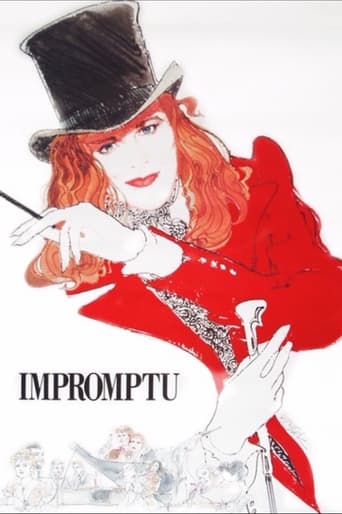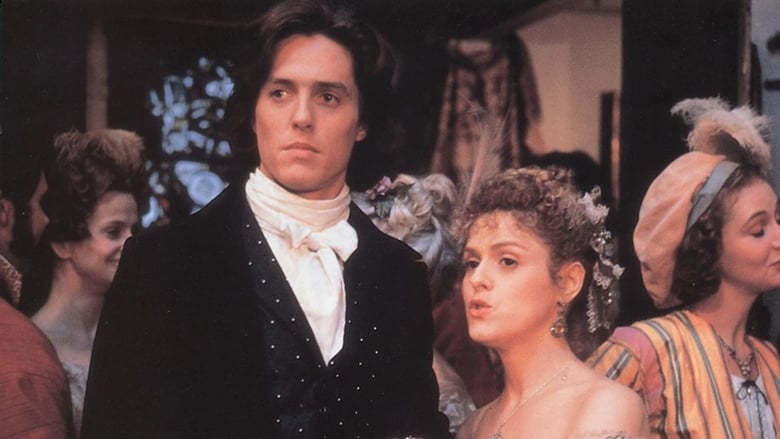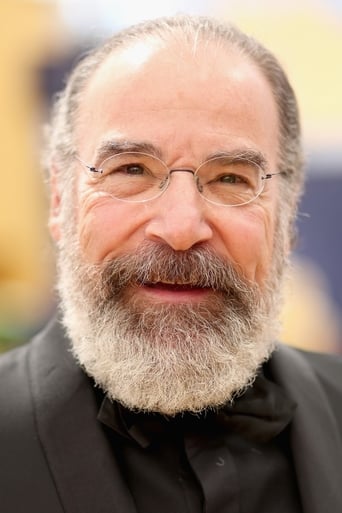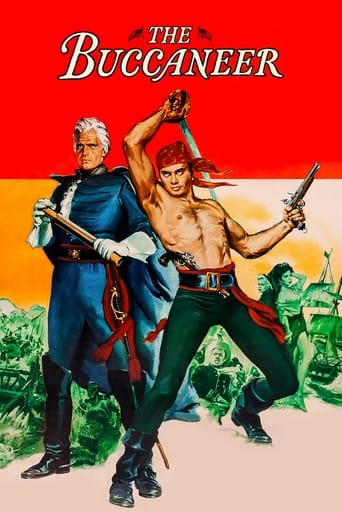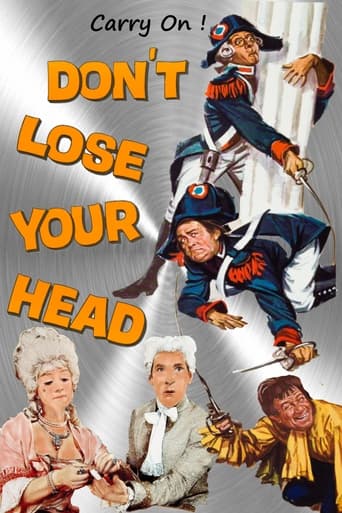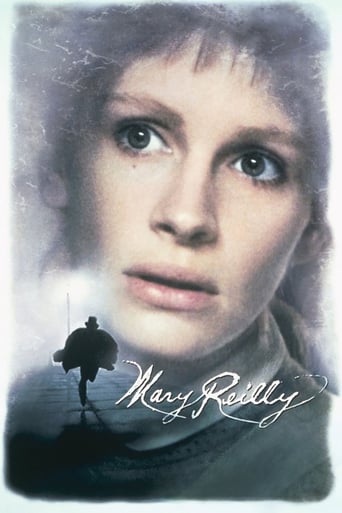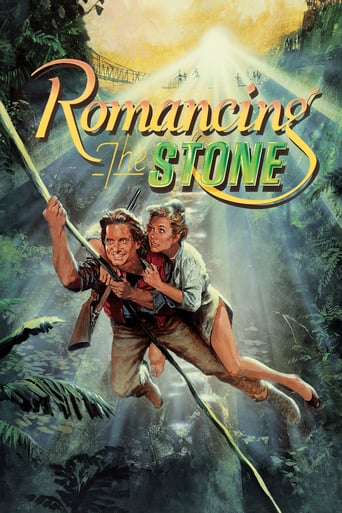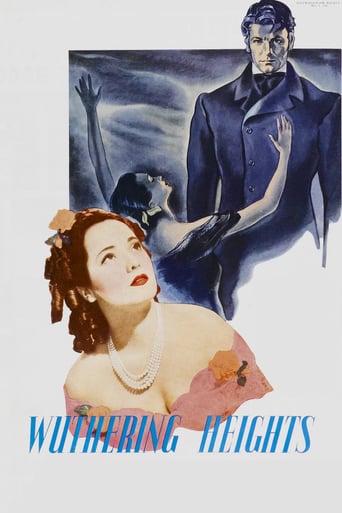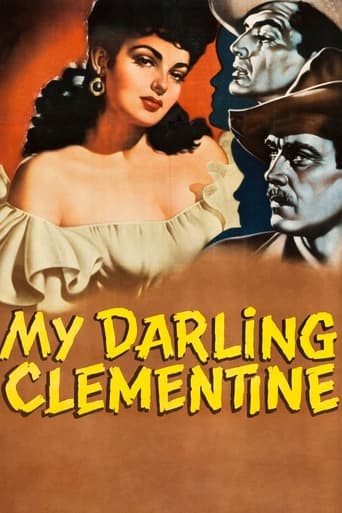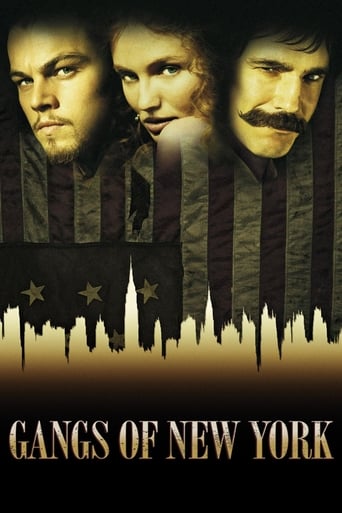Impromptu (1991)
In 1830s France, pianist/composer Frédéric Chopin is pursued romantically by the determined, individualistic woman who uses the name George Sand.
Watch Trailer
Cast


Similar titles
Reviews
Very well executed
For all the hype it got I was expecting a lot more!
Awesome Movie
It’s fine. It's literally the definition of a fine movie. You’ve seen it before, you know every beat and outcome before the characters even do. Only question is how much escapism you’re looking for.
I saw this movie IMPROMPTUIt was based on George Sand (Judy Davis) - a pseudo name of a novelist woman named Amantine Lucile Aurore Dupin who did everything to seek LOVE of a French pianist and composer Frederic Chopin (Hugh Grant).More importantly than the movie the understanding and portrayal of the character of George Sand was intriguing to say the least.She was a tom-boy. She always wore man's clothes. She was outspoken. and smoke continuously - mostly thick cigars. She was determined, individualistic and had her own mind and sense of right/ wrong and decisions. She belonged to somewhat aristocratic lineage. She had her own ways among the elites and rich. Her novels that she wrote in plenty helped her to her repute. She was tiny and dark in stature. Not very physically or facially attractive, but had her own charisma that charmed people. She was a strong lady, and bull-dozed her way with her opinions amongst men. She got married at the age of 16 years with a man much older than her, - got two kids by 18 years and fought a long divorce battle for custody of her children which she won - when such a thing was unimaginable. We are talking of 1804 (210 years back). She called herself - A ROMANTIC REBELLION. She over powered her prey (man) with passionate LOVE. She loved having sex and had multiple affairs with men. A man she put her eyes on - she was determined to lay him down and move on. This time was a pianist of soul-wrenching music composer Frederic Chopin. Among all men - her affair and liaison with Frederic was most passionate and that is why much has been written about it and even songs, lyrics, poems, plays and movies made on them.Frederic Chopin was a shy, timid, feminine person, and his first meeting with George Sand was not at all cordial. Frederic looked down on George condemning her for what she stood for and looked "What an unattractive woman she is. Is she really a woman?" were his exact comments to one of his friend. But George Sand did all things possible to seek Frederic - even wearing women's attire - just to show her feminine side to catch Frederic's attention, and she did. Frederic was head over heels in deep LOVE with her. So much so that he was ready to show his valor to one of George's former LOVER for a gun-fight.Their first "sort-off" trip together with her two children was captured in her autobiographical novel "Un hiver à Majorque" . This is where the movie ends Thanks to Director James Lapine for making the movie and that will keep the character immortal. Judy Davis tries to put some effort in playing the rolOne of the tender scenes in the movie is when Frederic confesses to George about his inability to bring himself to have sex with George, and the most outspoken and passionate George turns into a compassionate LOVER and says to Frederic."It does not matter. It is not necessary to have SEX. I LOVE YOU so much dear. I just want to be with you, near YOU. Spend rest of my life besides YOU. Like that can't we live happily ever after? It is not SEX I seek in YOU, I seek your LOVE. Tell me "Yes"....." Pleased and shy Frederic says "YES" George replies "At last you said YES to my LOVE"The movie apart from this wonderful central character is otherwise okay. Nothing much to write about - though interesting to discover a wonderful feminist icon - the first of its type. - George Sand.Story beyond the movie:As accounts narrate - while their first trip as a couple to the island of Majorque George and Federic had difficulty finding a place to stay at the island, because she was popular and not-so-popular with her ways - traveling with her kids and a men with whom she was not married - was considered a big NO NO - for locals to provide them with a decent accommodation. Frederic had weak constitution and suffered from cough and pneumonia that lead to his death due to tuberculosis. Those last few years George Sands left everything for him and served him as much as she could till the final moments of his death. After Frederic's death - George Sands lived for another 27 years and she had just one more affair - but not as passionate as with Frederic.
I saw this movie when it first came out 21 years ago and really liked it. On second viewing it didn't hold up so well, though. The sets and costumes are beautiful, such as you find in the best Merchant/Ivory films. The actors are all first rate. The problem is that the script is often either clichéd or silly - an adjective I don't think I've used in several decades. It's as if Merchant/Ivory left the writing of the script to the Woody Allen of Midnight in Paris. The various historical characters are all likable enough, and George Sand gets more fully developed as the movie progresses. Chopin comes off as a comical caricature, though, as does Musset - though he was probably rather like that in life. In fact, several of the Romantic artists who figure in this film probably did no little posing in their day, and may well have come off equally silly in real life.There's no reason why a movie like this should provide uniformly serious or realistic portrayals of the artists involved. It's a feature film, after all, and not a documentary. And as a feature film it is wonderful to look at and often entertaining to watch.For me, it would have been even more entertaining had it been a little less clichéd.
Every so often I find on TV a major film that I somehow never heard of but nevertheless is surprisingly good. I don't know how I missed this one before. It was recently on the cable channel PLEX with no commercial interruptions.Drama, comedy, and romance, all in one excellent film. Great script. Great cast. Great Music.Reunites stars of the musical "Sunday in the Park With George" but this time not singing and their characters have little interaction. Emma Thompson in a minor role. Judy Davis does a marvelous job as George Sands. Hugh Grant is a handsome but foppish and squeamish Frederick Chopin, and is as he usually is.* Nov. 13, 2014: The above review was written about 6 months ago. I just re-watched the film on MPLEX and didn't recall a single thing about it, so it was as if I was viewing it the first time. I still enjoined the film but I don't think it deserved my previous 10 star rating. I can't say it is one of my most enjoyed films.
Sometimes you just like a movie. I admit I was prepared to like this. It features Chopin, and he is a large part of my musical world. His stuff really is magical, but only when flowing through a rich vessel. The things he wrote when he was with Sands are a touchstone of sorts for sustained passion, the kind that roots you to air.And. And it has Judy. She seems to have made some very bad choices in projects, a situation I cannot understand. But when she's tuned in, she gives echoes of just the sort of passion I hear from Frederic. She's tuned in here, despite the ordinary direction. Her character is close to the one that initially impressed me, in her brilliant career. Judy is capable of folded acting, giving us emotion directly from a character and at the same time standing as the writer (here, the writer) reporting that emotion and the immediate context to us. It seems to have been perfected by Australian actresses.Plus, we have Emma Thompson. She's so early in her career she wasn't billed so that I could find, so she was a real surprise. She inserts an Austen-derived character, a brunette, moneyed dope wishing to become sharper by rubbing against artists. The script is ordinary, riskless, surprisingly so. But it has one clever moment when the artists assembled in her country home give a play that makes serious fun of their hosts. Two other joys; the men playing Chopin and Liszt actually do play the piano. And finally, through the whole thing we hear Chopin pieces. They aren't performed by passionate, controlled pianists, but any Chopin in a film is welcome stuff. I think on my film site, I'll have a list of films that have Chopin pieces as central. You'll be surprised how many there are. "Five Easy Pieces" and "Autumn Sonata" are the obvious ones.All this, plus a nice opening scene of our writer as a redheaded girl, are enough to give you pleasure. It almost helps that the direction and story are lifeless. They don't challenge. Its as if we had Chopin perform for us, giving us the harvest of his pain and none of the pain itself.Hugh Grant is wrong for Chopin, but apt for the placeholder named Chopin in this film. He has only one good scene, where he worries over an impromptu that seems contrived. It should reflect spontaneity, he thinks. It isn't that it needs to be actually spontaneous, but that it be crafted in such a way that gives that impression. What is the impression of spontaneity? If you have a chance, check out Martha Argerich, in her 1965 recording. You want overflowing passion that seems always on the edge of falling but is shaped smoothly? You will never be the same. Thank George Sand, I think.The one really dire problem is that they used his piano music without regard to whether it would have been then written.Ted's Evaluation -- 3 of 3: Worth watching.

